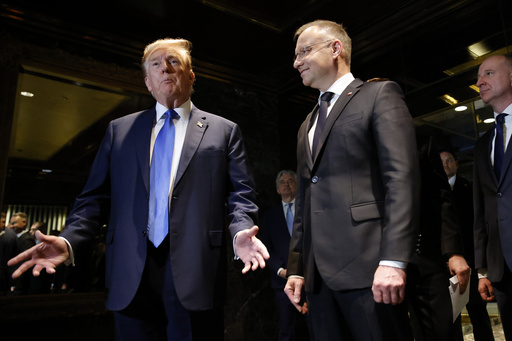
WARSAW, Poland — Members of the Polish parliament from conservative factions celebrated Donald Trump’s electoral victory with enthusiasm, rising to their feet and cheering his name. This anticipation for a potential second term has invigorated populist groups across Central Europe, who resonate with his anti-immigrant rhetoric and skepticism toward international institutions.
However, there is also significant concern within the region, particularly given its proximity to the ongoing conflict in Ukraine. Many fear that Trump might abandon support for Ukraine, leading to an arrangement that could embolden Russia, or even reduce the U.S. military presence in Europe. Micha? Baranowski, the managing director of GMF East, a branch of the German Marshall Fund think tank based in Warsaw, notes that this shift in U.S. politics compels Europe to enhance its own defense and security initiatives rather than rely on American protection, as has been customary for decades.
“We Europeans—Poles, French, Brits, and hopefully Germans as well—must take greater responsibility,” Baranowski stated. “Only by taking initiative can we prevent worst-case scenarios from unfolding, such as a poor resolution in Ukraine or a decrease in American involvement in Europe.”
During the Cold War, Poland, the Baltic states, and several other nations in Central and Eastern Europe were under Russian dominance. The end of that era in 1989 allowed them to turn towards the West, with a staunch determination to avoid reverting to a subordinate status under Moscow’s influence. As NATO members, these countries are particularly apprehensive that Trump could undo decades of commitments aimed at securing peace in Europe. This week saw the inauguration of a missile defense facility in northern Poland, the culmination of years of bipartisan planning in the U.S., leading Polish officials to express optimism about the enduring commitment from Washington.
“The entire world will recognize that this is no longer Russia’s sphere of interest,” asserted Polish President Andrzej Duda. Trump, in the past, has expressed disdain for NATO, with former officials indicating he frequently suggested the possibility of withdrawing the U.S. from the alliance. Supporters of Trump maintain that this approach was merely a tough negotiating strategy that successfully encouraged European allies to assume greater responsibility, asserting that he did not ultimately abandon NATO.
The political landscape in Poland is also shifting rapidly due to the recent developments in Washington as the nation gears up for a presidential election in the spring. Foreign Minister Radek Sikorski, who has experience in defense and connections in Washington, has entered the race to represent the centrist party led by Prime Minister Donald Tusk, challenging the leading candidate, Warsaw Mayor Rafa? Trzaskowski. Sikorski contends that his background equips him to handle the current climate effectively, while his critics point out potential complications stemming from his wife, American author Anne Applebaum’s, anti-Trump sentiments.
As the region collectively awaits the implications of a potential second Trump presidency, Polish and Baltic officials are publicizing their significant defense expenditures relative to their economic performance in messages to Trump. Kersti Kaljulaid, who served as Estonia’s president during Trump’s first term, conveyed that Eastern European nations had previously found ways to engage with Trump, a skill she believes they still possess.
A key concern includes whether Trump will pursue a resolution with Russia regarding the ongoing war in Ukraine. Any agreement could have lasting implications for regional security. The worst-case scenario involves a settlement that cedes significant Ukrainian territory to Russia, effectively rewarding President Vladimir Putin’s breaches of international law and enabling Moscow to restore its military capabilities.
Tusk has maintained that any negotiations should not transpire without the consent of Ukraine and the nations directly affected by the outcomes. “The emerging political landscape undoubtedly poses challenges for everyone,” Tusk remarked last Saturday. Following Trump’s victory, he has adopted a more conciliatory tone, despite having previously criticized Trump’s perceived leniency toward Putin.
Duda, a conservative who has admired Trump for years, expressed his belief that Trump would not forsake Ukraine, especially given the substantial investments made by American taxpayers in Ukraine’s defense. “Trump is a winner,” Duda remarked. “I can’t envision him permitting Russia to dismantle Ukraine.”
Trump’s victory has mobilized Polish nationalists, who gathered in large numbers for an Independence Day march, with participants hopeful that Trump’s rapport with Russia might lead to peace in Ukraine. “If he’s pro-Russian and that translates to global peace, I find that acceptable,” commented Adrian Golik, a 23-year-old student participating in the event along with his family. All possess dual Polish-U.S. citizenship and voted for Trump in Illinois.
Leaders from Hungary and Slovakia, both perceived as favorable toward Trump and Putin, have suggested that Ukraine has already been defeated and should discontinue Western military aid. Slovak Prime Minister Robert Fico has framed Trump’s win as a victory against “liberal and progressivist ideas,” while Hungarian Prime Minister Viktor Orbán referred to Trump as “the man of peace,” predicting that his administration would withdraw U.S. support for Ukraine.
Baranowski cautioned, “One of the primary messages of this election is that Europe must mature in its geopolitical understanding swiftly, as the era of relying on others for security is coming to an end. The stakes are substantial—Europe has the opportunity to influence events if we unite and take decisive action.”
